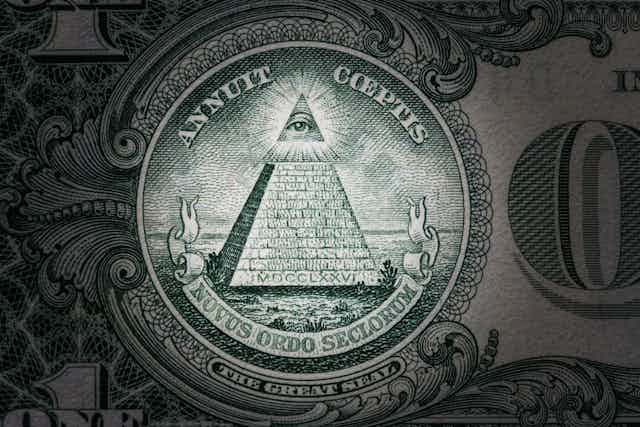How are the origins of the French Revolution connected with Beyoncé, Jay Z and Rihanna? The answer lies with one of the world’s most mysterious – and misunderstood – secret societies, the Illuminati.
The strange evolution of the conspiracy theory surrounding this short-lived secret society, mirrors the modern history of conspiracy theories. We find out how in part three of our podcast series.
The Illuminati was a real secret society of intellectual elites in the late 18th century. Michael Butter, professor of American literary and cultural history at the University of Tübingen in Germany, tells us their goal was to promote Enlightenment thinking – ideas such as rational thought and the separation of church and state.
Their goal was to transform society. Not violently by causing a revolution. But by educating people. By planting ideas in the minds of people over a very, very long period of time.
The society only lasted a few years before being forced to disband by the conservative authorities of the tine. But conspiracy theorists say the Illuminati never really disappeared.
They were accused of orchestrating the French Revolution, which started in 1789. Andreas Önnerfors, associate professor of intellectual history at the University of Gothenburg in Sweden, says it was such a violent revolution and caused so much upheaval across Europe that people looked for someone to blame.
Within a couple of years, you were going from an absolutist monarchy that is underpinned by Catholicism as a state ideology to a secular republic where religion is completely wiped out as the foundation of statehood. So it is a radical change.
Önnerfors explains how the Illuminati conspiracy theory emerged as part of a conservative backlash against the revolution. Politicians in Britain were afraid the upheaval would spread across the Channel and there were people in France who wanted to turn the clock back on the revolution. They started pushing the idea that there were nefarious forces at work behind the scenes and blamed the Illuminati for masterminding the whole outcome of the revolution.
We find out how the Illuminati became the bogeyman for dark forces at work in the world. Then, how the conspiracy theory dramatically morphed in the 20th century.
First, following the publication of the Protocols of the Elders of Zion, a fake transcript of a secret meeting of Jewish leaders plotting world domination. The document was quickly proven to be a piece of fiction but nonetheless became a powerful piece of political propaganda. Grouping Jews together with the pre-existing ideas of the Illuminati made for a toxic mix.
Then, after the second world war, we discover how the Illuminati conspiracy theory was picked up by conservatives in the US and played a part in fuelling anti-communist witch hunts. And researcher Lindsay Porter explains how things took a weird turn in the 1960s when elements of the counterculture began to parody the conspiracy theory.
Two Playboy editors published an 800-page work of fiction called The Illuminatus! Trilogy. It accused everyone they could think of – including Martian invaders – of being part of the Illuminati. But instead of killing the conspiracy theory, people started quoting the book as if it was a real exposé.
Finally, we reach the present day and find out how various pop stars are now accused of being part of this secret society that rules the world. In many ways it’s highly entertaining. As Porter tell us, however, it also has dark undertones, often incorporating sexism and racism.
The Anthill podcast is produced by Annabel Bligh and Gemma Ware. Sound design is by Eloise Stevens, with original music from Neeta Sarl and audio from Epidemic Sound. A big thanks to City, University of London, for letting us use their studios.









